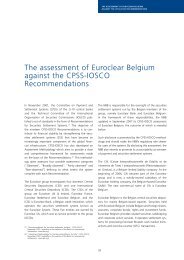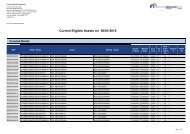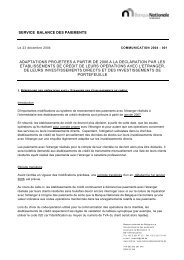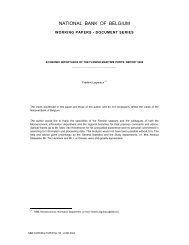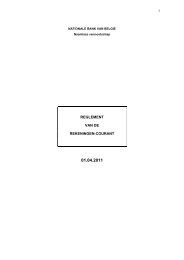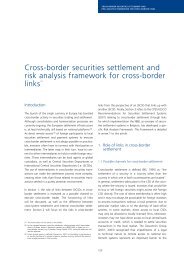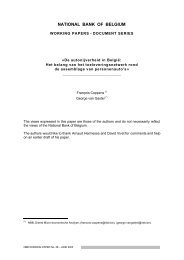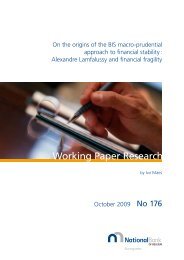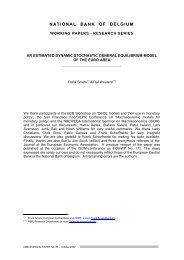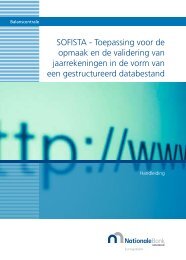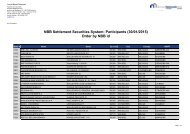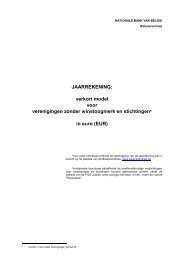Cooperative oversight principles and implementation for Euroclear ...
Cooperative oversight principles and implementation for Euroclear ...
Cooperative oversight principles and implementation for Euroclear ...
You also want an ePaper? Increase the reach of your titles
YUMPU automatically turns print PDFs into web optimized ePapers that Google loves.
<strong>Cooperative</strong> <strong>oversight</strong> <strong>principles</strong> <strong>and</strong> <strong>implementation</strong> <strong>for</strong><strong>Euroclear</strong> SA <strong>and</strong> SWIFTprovider to the global financial infrastructure of relevanceto the <strong>oversight</strong> activities of many central banks, thePrinciples, if applicable to SWIFT, need to be reinterpretedto suit the specificities of a services provider in which themajor sources of risk are almost exclusively of an operationalnature, <strong>and</strong> in which typical risks of (multicurrency)payment <strong>and</strong> settlement systems are absent. A reinterpretationof each Principle suitable to SWIFT is given below.<strong>Cooperative</strong> <strong>oversight</strong> principle 1 : NotificationInterpretation <strong>for</strong> SWIFT : TransparencySWIFT is a messaging services provider that has financialinstitutions in more than 200 countries as clients. Thecross-border dimension is inherent to the majority ofthese services, <strong>and</strong> SWIFT is well-known to central banksthroughout the world. This is, amongst other reasons,because many central banks are SWIFT users themselves,<strong>for</strong> instance, <strong>for</strong> the messaging services in their country’slarge value payment system, which is most often eitheroperated by or set up under the authority of the centralbank. When central banks become SWIFT members, theyget involved in the SWIFT governance process <strong>and</strong> arethus in<strong>for</strong>med of changes at SWIFT or are consulted onintended changes through the SWIFT consultation processes.Furthermore, they can obtain in<strong>for</strong>mation on theexternal security auditor’s yearly assessment of the SWIFTcontrol framework (control objectives, criteria <strong>and</strong> supportingcontrols) in SWIFT’s SAS 70 report. Transparencyto central banks is thus provided by SWIFT itself in thesame way as SWIFT provides in<strong>for</strong>mation to its otherusers.Besides the disclosure of in<strong>for</strong>mation by SWIFT, overseersalso communicate on the international cooperative<strong>oversight</strong> arrangements <strong>for</strong> SWIFT. In its role as leadoverseer of SWIFT, the NBB has been describing publiclyvarious aspects of the arrangements in several issues ofits Financial Stability Review <strong>and</strong> annual report. Similarreferences are made by the other G10 central banksinvolved in the cooperative <strong>oversight</strong> of SWIFT. On an adhoc basis, the NBB also keeps in contact with non-G10central banks, to explain the SWIFT <strong>oversight</strong> arrangementsto them.<strong>Cooperative</strong> <strong>oversight</strong> principle 2 :Primary responsibilityInterpretation <strong>for</strong> SWIFT : Responsibility according toSWIFT’s role in domestic systemsIn the international cooperative <strong>oversight</strong> arrangement<strong>for</strong> SWIFT, the NBB, as lead overseer, is the primary pointof contact between SWIFT <strong>and</strong> the overseers. Oversightassessments are a joint undertaking by the G10 centralbanks. In the various SWIFT <strong>oversight</strong> groups, representativesfrom the G10 central banks aim at buildingconsensus views in order to communicate their commonassessment <strong>and</strong> recommendations to SWIFT. It wouldbe inefficient, <strong>and</strong> could lead to inconsistent actions, ifcentral banks acted in an uncoordinated way. The G10central banks act in close cooperation so as to give centralbanks more influence over SWIFT than they would haveif acting on a solo basis. However, the joint undertakingof the G10 <strong>oversight</strong> activities vis-à-vis SWIFT does notbring about any changes in the regular division of responsibilitiesbetween central banks, since each of these bankscontinues to assume responsibility according to the extentto which SWIFT is being used in its domestic payment <strong>and</strong>settlement systems.It is true that the smooth operation of SWIFT is alsorelevant to central banks beyond the confines of theG10 central banks that are conducting the internationalcooperative <strong>oversight</strong> of SWIFT, as these non-G10 centralbanks are responsible <strong>for</strong> monitoring the smooth operationof their own domestic systems. As there is a limit tothe number of people that can directly interact effectivelywith SWIFT, the overseers of SWIFT are open to dialoguewith other central banks, on the one h<strong>and</strong>, to assist themin identifying relevant in<strong>for</strong>mation that is readily availablefrom SWIFT, <strong>and</strong>, on the other h<strong>and</strong>, to in<strong>for</strong>m them ofthe set-up of the SWIFT <strong>oversight</strong> arrangements.<strong>Cooperative</strong> <strong>oversight</strong> principle 3 : Assessment ofthe system as a wholeThis principle can be deemed applicable to SWIFTunamendedOverseers developed the High Level Expectations <strong>for</strong> theOversight of SWIFT as a tool in assessing the SWIFT systemas a whole. The High Level Expectations are presented ina separate article of this Financial Stability Review. Thetopics identified <strong>for</strong> an <strong>oversight</strong> review at SWIFT are beingselected on the basis of a risk-based <strong>oversight</strong> assessmentwithin the framework of the High Level Expectations. Asa starting point, the whole SWIFT organisation <strong>and</strong> allits various activities are being considered, but only those93



